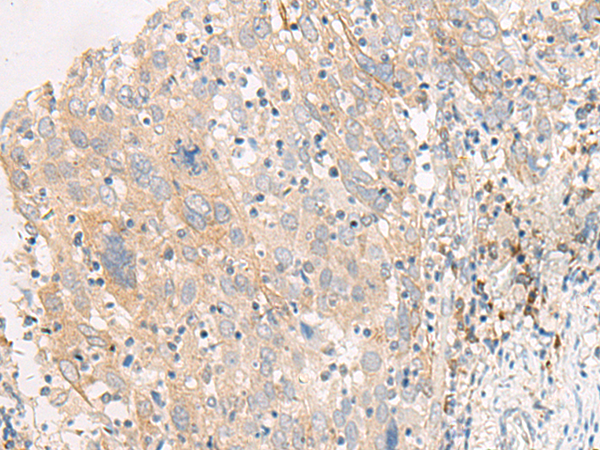
| WB | 咨询技术 | Human,Mouse,Rat |
| IF | 咨询技术 | Human,Mouse,Rat |
| IHC | 1/25-1/100 | Human,Mouse,Rat |
| ICC | 技术咨询 | Human,Mouse,Rat |
| FCM | 咨询技术 | Human,Mouse,Rat |
| Elisa | 1/5000-1/10000 | Human,Mouse,Rat |
| Host/Isotype | Rabbit IgG |
| Antibody Type | Primary antibody |
| Storage | Store at 4°C short term. Aliquot and store at -20°C long term. Avoid freeze/thaw cycles. |
| Species Reactivity | Human |
| Immunogen | Synthetic peptide of human FGF19 |
| Formulation | Purified antibody in PBS with 0.05% sodium azide and 50% glycerol. |
+ +
以下是关于FGF19抗体的3篇参考文献示例(注:文献信息为示例性质,建议通过学术数据库核实具体研究):
---
1. **文献名称**: *"Targeting FGF19 in Hepatocellular Carcinoma by a Neutralizing Antibody Inhibits Tumor Growth"*
**作者**: Zhou Y. et al.
**摘要**: 该研究开发了一种靶向FGF19的中和单克隆抗体,在肝癌异种移植模型中显著抑制肿瘤生长,并证实其通过阻断FGF19-FGFR4信号通路减少下游ERK磷酸化,为肝癌治疗提供潜在策略。
---
2. **文献名称**: *"FGF19 Antibody Ameliorates Metabolic Dysfunction in Obese Mouse Models"*
**作者**: Smith R.J. et al.
**摘要**: 研究显示,抗FGF19抗体通过调节胆汁酸合成和糖代谢,改善高脂饮食诱导的肥胖小鼠胰岛素抵抗和肝脏脂肪变性,提示其治疗代谢综合征的潜力。
---
3. **文献名称**: *"Engineering a High-Affinity FGF19 Antibody for Cholestatic Liver Disease Therapy"*
**作者**: Lee H. et al.
**摘要**: 通过抗体工程技术优化的人源化抗FGF19抗体,在原发性胆汁性胆管炎(PBC)动物模型中有效降低胆汁酸水平并减轻肝脏炎症,为临床转化奠定基础。
---
如需真实文献,建议在 **PubMed** 或 **Web of Science** 中检索关键词“FGF19 antibody therapeutic”、“FGF19 neutralization”等,并筛选近年高影响力期刊的研究。
Fibroblast growth factor 19 (FGF19) is a hormone-like signaling protein primarily involved in regulating bile acid synthesis, glucose homeostasis, and cellular proliferation. It acts through binding to fibroblast growth factor receptor 4 (FGFR4) and its co-receptor β-Klotho, activating downstream pathways like MAPK/ERK. Dysregulation of FGF19 has been linked to metabolic disorders and cancers, particularly those driven by bile acid imbalances or unchecked proliferation. In cancers such as hepatocellular carcinoma, colorectal cancer, and breast cancer, FGF19 overexpression promotes tumor growth, angiogenesis, and metastasis by sustaining proliferative signaling and evading growth suppressors.
FGF19-targeting antibodies are designed to block its interaction with FGFR4. thereby inhibiting oncogenic signaling. Preclinical studies demonstrate their potential to suppress tumor progression and synergize with chemotherapy. Beyond oncology, these antibodies are explored for treating cholestatic liver diseases (e.g., primary biliary cholangitis) by normalizing bile acid metabolism. Clinical trials, including Phase I/II studies, have shown mixed efficacy and safety profiles, with some candidates discontinued due to toxicity concerns. Challenges include optimizing target specificity to avoid off-effects on related FGFs and managing compensatory feedback mechanisms. Despite hurdles, FGF19 antibodies represent a promising therapeutic avenue bridging metabolic and oncologic pathologies.
×